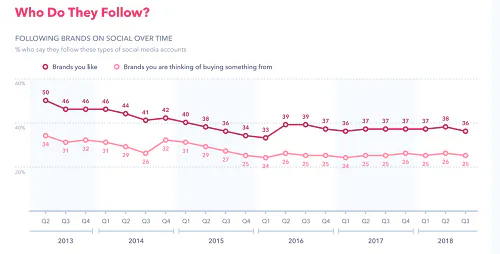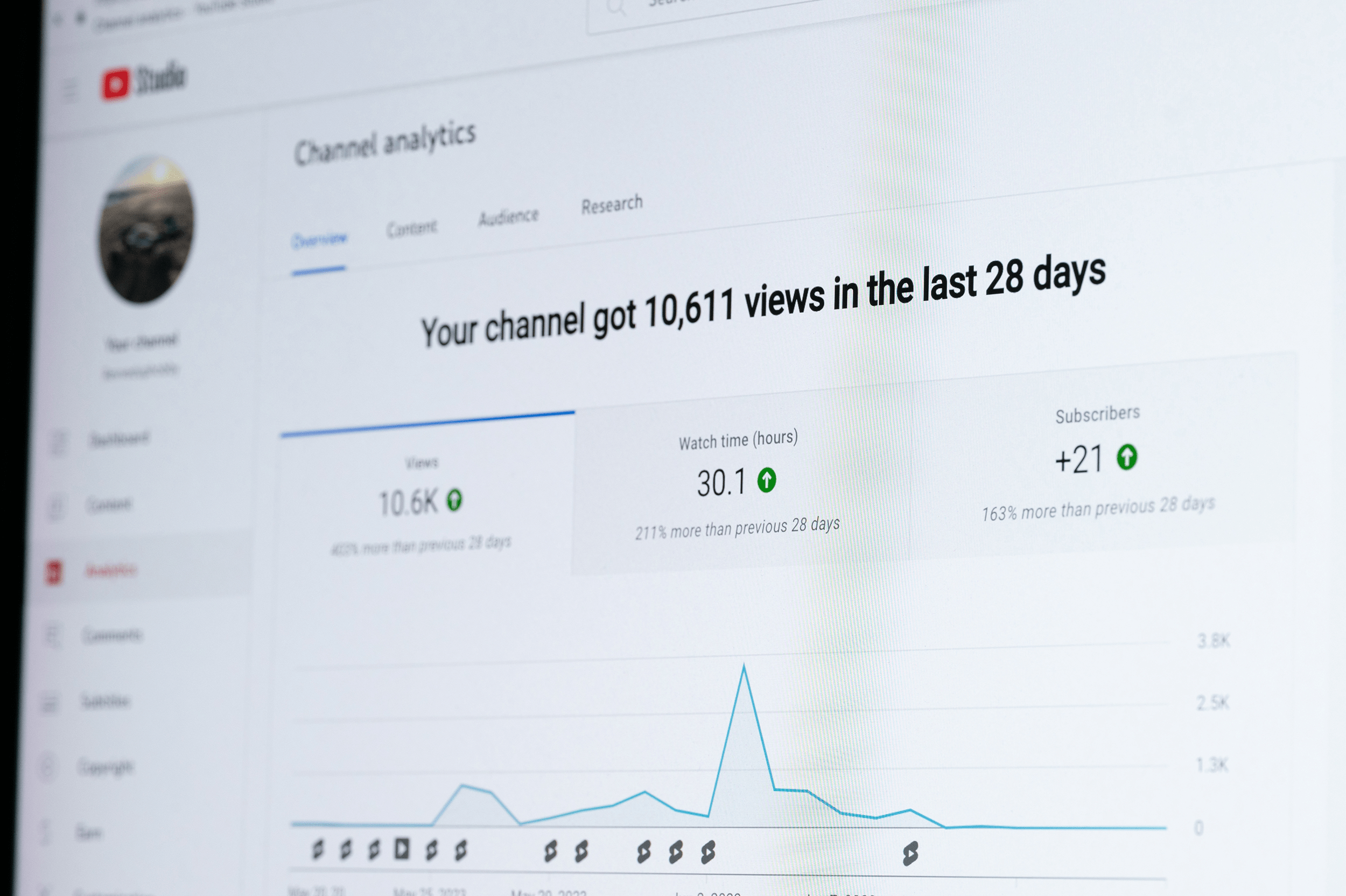Während Google nach wie vor die bevorzugte Suchmaschine für die meisten Menschen ist - mit 92,46% Marktanteil unter den Suchmaschinen, so das Ergebnis. StatCounter - Facebook behauptet sich bei der lokalen Suche und ist für viele Konsumenten, die sich an den Social Media-Giganten wenden, um nach Marken und Produkten zu recherchieren, neue Produkte zu entdecken und vieles mehr, eine wichtige Station auf der Kundenreise. Hier ist, was Vermarkter über die Facebook-Suche wissen müssen und wie Sie sie zu Ihrem Vorteil nutzen können.
Warum Social Media für Marken wichtig ist

Screenshot bei GlobalWebIndex
In seinem Bericht 2019 über Social Media Trends, GlobalWebIndex fand heraus, dass 42% der Verbraucher Social Media nutzen, um neue Marken oder Produkte zu erforschen, und 29% der Verbraucher sagen, dass es einer ihrer Hauptgründe für die Nutzung von Social Media ist. Knapp die Hälfte (48%) der Verbraucher könnten als " bezeichnet werden.Markeninteraktionäre"oder diejenigen, die Inhalte von Marken mögen, verfolgen und teilen, auf beworbene oder gesponserte Beiträge klicken oder anderweitig mit Marken auf Social Media in Kontakt treten. 36% der Social-Network-Nutzer geben an, dass sie ihren Lieblingsmarken in sozialen Netzwerken folgen, und 25% folgen Marken, von denen sie einen Kauf in Betracht ziehen.
Social Media Plattformen wie Facebook ermöglichen es den Konsumenten, neue Marken und Produkte zu entdecken und sich mit Marken zu verbinden, denen sie treu sind. Aber über das Bezahlen von Facebook-Anzeigen und zu versuchen, die Leute zu überlisten. Facebook-Algorithmus um Ihre organische Reichweite zu erhöhen, bietet Facebook eine weitere Möglichkeit für Nutzer, Inhalte, die sie interessieren, auf der Plattform über die Facebook-Suche zu finden.
Eine kurze Geschichte der Facebook-Suche

Screenshot bei Facebook
Im Jahr 2013, Facebook Graphensuche eingeführtist eine semantische Suchmaschine zur Beantwortung von natürlichsprachlichen Anfragen von Benutzern, indem sie Informationen von Freunden der Benutzer sammelt. Benutzer können nach Personen, Orten, Seiten, Orten suchen, an denen ihre Freunde eingecheckt oder markiert sind, und vieles mehr. Während die Graph-Suche auf der Strecke blieb, da Facebook seine Suchalgorithmen weiter aktualisierte, wurden einige seiner Kernfunktionalität bleibt erhalten heute.
Im Jahr 2015, Facebook Suche gestartet FYIbietet automatisch ausgefüllte Vorschläge, die auf Echtzeitereignissen basieren, während Benutzer in die Suchleiste eingeben, mit Ergebnissen, die nicht nur die Beiträge von Freunden, sondern auch öffentliche Beiträge enthalten, so dass Benutzer beliebten Geschichten und Trendnachrichten folgen können.
So funktioniert die Facebook-Suche
Search FYI, wie Graph Search, ist ein personalisiertes Produkt, das Folgendes produziert Ergebnisse auf der Grundlage der Benutzeraktivität auf Facebook - aber nicht die Aktivität des Benutzers außerhalb der Plattform. Zu den Aktivitäten, die die Suchergebnisse beeinflussen können, gehören:
- Inhalte, die deine Freunde mit dir teilen
- Seiten, denen Sie folgen
- Gruppen, in denen du Mitglied bist
- Ereignisse, die Sie verfolgen
- Beiträge, mit denen du in deinem News Feed interagiert hast.
- Informationen, die du in deinem Profil angegeben hast.
- Orte, an denen Sie markiert wurden
- Ihre bisherigen Suchanfragen
Community-Aktivitäten, wie z.B. die Beliebtheit dessen, wonach ein Benutzer sucht und wie kürzlich etwas veröffentlicht wurde, können ebenfalls die Suchergebnisse beeinflussen.
Die Standard-Ergebnisansicht ist "Alle", aber Benutzer können mehrere Optionen auswählen, um Ergebnisse anzuzeigen, die spezifisch für den Marktplatz, Beiträge, Personen, Fotos, Videos, Seiten, Orte, Gruppen, Apps, Ereignisse oder Links sind. Es gibt noch mehr Filteroptionen entlang der linken Seitenleiste (auf dem Desktop), mit denen Benutzer Ergebnisse zu Beiträgen von Personen, bestimmten Freunden usw., Arten von Beiträgen, Beiträgen aus Gruppen, Beiträgen mit markierten Positionen und Datumsbereichen filtern können.
Was bedeutet Facebook-Suche für Vermarkter?
Was bedeutet das alles für Sie, einen Vermarkter? Sie können zwar nicht kontrollieren, wonach Facebook-Nutzer suchen, aber Sie können die Suchfunktion von Facebook auf einige Arten zu Ihrem Vorteil nutzen.
Verwenden Sie die Facebook-Suche, um Ihr Publikum zu finden.
Sie fragen sich, an welchen Zielgruppen Ihre Zielkunden teilnehmen, welche Seiten sie besuchen und was ihre Interessen sind? Verwenden Sie die Facebook-Suche, um Entdecken Sie Ihr Publikum und erhalten wertvolle Einblicke in ihre Interessen und Aktivitäten. Geben Sie einfach relevante Keywords in die Suchleiste ein und erkunden Sie die Seiten, Gruppen, Personen, Orte und Ereignisse, die in den Suchergebnissen angezeigt werden. Die Erforschung der anderen Interessen Ihres Publikums kann Ihnen helfen. großartige Blog-Post-Ideenauch.
Verwenden Sie die Facebook-Suche, um öffentliche Beiträge mit einem bestimmten Link zu finden.

Wenn Sie sich fragen, was die Facebook-Community über Ihren neuesten Blogbeitrag (oder den viralen Blogbeitrag Ihres Mitbewerbers) gesagt hat, können Sie die Suche nutzen, um alle öffentlichen Beiträge zu finden, die mit dem Link verbunden sind, indem Sie einfach die URL in die Suchleiste einfügen.
Optimieren Sie Ihre Facebook-Seiten für die Suche.
Wenn Benutzer auf Facebook nach etwas suchen, verwenden sie Schlüsselwörter und Phrasen - genau wie bei Google. Obwohl der Suchalgorithmus von Facebook und der von Google nicht identisch sind, können Sie die gleichen Grundprinzipien anwenden, um Ihre Seite für die Suche auf Facebook zu optimieren. Das vollständige Ausfüllen Ihrer Facebook-Seiteninformationen, einschließlich Ihres Abschnitts "Über", Ihrer Website, Ihrer Adresse und Telefonnummer und anderer Details, kann dazu beitragen, dass Ihre Facebook-Seite in Marken- und Kategoriensuchen angezeigt wird, und Ihre Standortinformationen sind unerlässlich, um in den lokalen Suchergebnissen der Benutzer angezeigt zu werden, wie beispielsweise in "Restaurants in meiner Nähe".
Vergiss deine Facebook-Posts nicht.
Deine Facebook-Seite ist nicht das Einzige, was du für die Suche optimieren kannst. Obwohl Sie Ihre Facebook-Posts nicht übermäßig optimieren sollten, schadet es sicherlich nicht, sicherzustellen, dass Ihr Post-Inhalt relevante Keywords enthält. Greifen Sie nicht auf Taktiken wie Keyword-Füllung oder das Hinzufügen völlig irrelevanter (aber beliebter) Keywords zu Ihren Beiträgen zurück - Sie möchten, dass Ihr Publikum sich auch mit Ihren Beiträgen beschäftigt, so dass Sie sie nicht mit Spam-Inhalten deaktivieren wollen. Apropos Engagement.....
Maßnahmen zur Steigerung des Engagements ergreifen
Denken Sie daran, dass die Suchergebnisse von Facebook nicht nur auf der Aktivität des Nutzers auf der Plattform basieren, sondern auch auf der Aktivität der Gemeinschaft. Das bedeutet, dass öffentliche Beiträge mit einem höheren Maß an Engagement eher in relevanten Suchergebnissen auftauchen können als Beiträge mit wenig oder gar keiner Aktivität. Seiten mit höherem Engagement haben auch eine höhere Wahrscheinlichkeit, dass ihre Beiträge in echte Facebook-Follower". Newsfeeds, was die organische Reichweite erhöht - eine Win-Win-Situation also.
Eine einfache Möglichkeit, mehr Traktion auf Facebook zu erreichen, ist die folgende installieren soziale Medien Teilen Buttons auf Ihrer Website, um die Leser zu ermutigen, Ihre Inhalte auf Facebook und anderen sozialen Netzwerken zu teilen, was die Popularität, Reichweite und Sichtbarkeit Ihrer Inhalte erhöht. Diese Beiträge werden nicht nur in den Feeds der Freunde dieser Benutzer angezeigt, sondern auch öffentliche Beiträge können in den Suchergebnissen für relevante Suchen erscheinen. Installieren Sie die Facebook Teilen Button, heute - es dauert nur noch wenige Minuten, um es den Besuchern leicht zu machen, Ihre Inhalte zu teilen!
Und schließlich finden Sie in unseren Leitfäden zum Thema Facebook-Marketing Antworten auf Fragen wie diese: Wie pinne ich einen Beitrag auf Facebook an?




